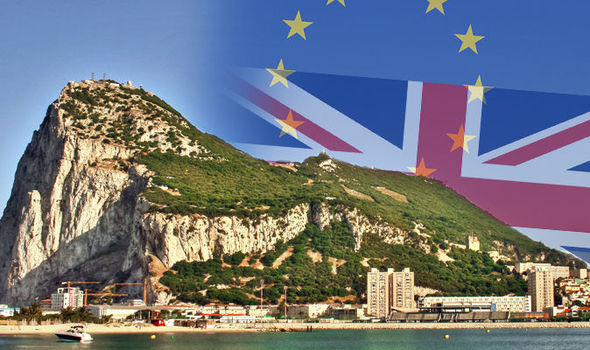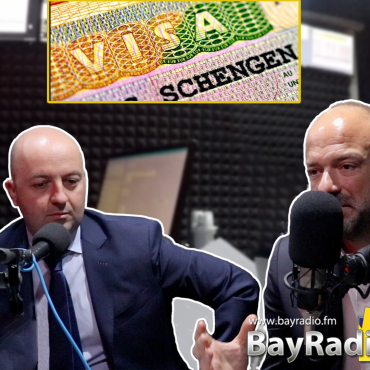-
 play_arrow
play_arrow
BayRadio Listen Live Broadcasting in Spain


The UK government says Gibraltar cannot independently negotiate a passport-free travel deal with the EU after Brexit.
On Friday, Chief Minister of Gibraltar Fabian Picardo said joining the EU’s Schengen zone could be advantageous for the tiny UK territory.
All but six EU member states are in Schengen, enabling citizens to travel passport-free across borders in the EU.
A UK government spokesperson said Gibraltar’s arrangements would be part of UK-EU talks on future relations.
Maintaining ease of movement across borders will be part of those negotiations after Brexit, which is scheduled for 31 January, the spokesperson said, pointing to the UK-EU Political Declaration on future ties.
About 15,000 people enter Gibraltar daily from Spain for work, and Brexit has fuelled concern that there could be expensive delays as passports are examined at the border. The border is only 1.8km (one mile) long.
Curbing freedom of movement is a core issue in the UK’s exit from the EU, with the UK government determined to lower immigration from the EU.
“After we leave, the UK will be negotiating the future relationship with the EU on behalf of the whole UK family, including Gibraltar. Working closely together, the UK and Gibraltar Governments have always supported arrangements at the border with Spain which promote fluidity and shared prosperity in the region,” the UK spokesperson said.
“The UK, including Gibraltar, is not part of the borderless Schengen zone.”
A UK-Gibraltar Concordat, agreed in 2018, noted the Rock’s “specific situation” and pledged that “particular regard will be had… to the mobility of persons and in the services economy”.
Gibraltar, with a population of about 32,000, voted by 96% to remain in the EU, in the 2016 referendum.
Speaking to the AFP news agency on Friday, Mr Picardo said: “We talked about this issue before Brexit… about Gibraltar becoming part of the Schengen zone.
“If you look at other microstates in Europe, they take the benefit of common travel areas with Schengen, even if they’re not entirely part of the Schengen information system,” he said.
Liechtenstein is one such tiny state, which is in Schengen but not in the EU.
“There is the ability to move fluidly between the territories of the EU and these microstates,” Mr Picardo said.
“All of these things will be considered in the context of the negotiations going forward.”
- Gibraltar is a limestone outcrop on the southern tip of the Iberian peninsula, adjacent to Spain
- Gibraltarians are British citizens but they run their own affairs under a chief minister
- The territory is self-governing in all matters – including taxation – except foreign policy and defence, which are dealt with by the UK government
- Despite its small size, Gibraltar is strategically important, standing only 12 miles from the north coast of Africa. It has a UK military base, including a port and airstrip
A Gibraltar government spokesman told the BBC that joint Gibraltar-Spain committees “have been meeting regularly during the Brexit talks” to clarify the territory’s arrangements post-Brexit.
The spokesman said Mr Picardo “could foresee a common travel area which would do a deal with Schengen”.
Four memoranda of understanding, attached to the UK Withdrawal Agreement, cover Gibraltar’s relations with Spain on: citizens’ rights; the environment; police and customs; tobacco and other products.
Written by: BayRadio News
Similar posts
Recent Posts
- Robotic Surgery for Prostate Cancer: What Is Radical Prostatectomy and How Does the Da Vinci Robot Improve It
- What Is Fibromyalgia? Symptoms and Treatments of an Invisible Illness That Requires Specialized Attention
- AMASVISTA Glass: 10 reasons to choose SUNFLEX glass curtains
- Robotic Surgery, Immunotherapy and Comprehensive Care Take Centre Stage at Pancreatic Cancer Conference at Quirónsalud Torrevieja
- Robotic Surgery Against Ovarian Cancer: Greater Precision, Less Pain and Faster Recovery

Ctra. Cabo La Nao, CC La Nao, Local 6 03730 Javea, Alicante, Spain
Advertise with us
Do you have a business in Spain? Do you provide a service to the expat community in Spain? Would you like your message to reach over 500.000 people on a weekly basis?
BayRadio is a community orientated radio station offering fantastic content to our many listeners and followers across our various platforms. Contact us now and find out what Bay can do for you!
Our business is helping your business grow.
BAY RADIO S.L. © 2024. ALL RIGHTS RESERVED. WEB DESIGN BY MEDIANIC







